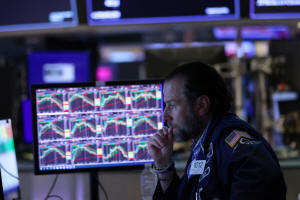Analysis-Wall Street heavyweights warn of pain ahead despite market’s
recent reprieve
 Send a link to a friend
Send a link to a friend
 [January 26, 2023] By
David Randall [January 26, 2023] By
David Randall
NEW YORK (Reuters) - Some of Wall Street’s biggest names are throwing
cold water on expectations that the U.S. economy will scrape through
2023 without a recession, even as hopes of easing inflation and
resilient growth propel stocks higher.
Banks and asset managers that have reiterated recession calls include
BlackRock, Wells Fargo and Neuberger Berman, with many warning the
Federal Reserve is unlikely to force inflation lower without hurting
economic growth.
The warnings contrast with signs of optimism in markets. The S&P 500 has
jumped more than 4% so far in 2023, fueled in part by bets that
inflation will continue to slow, allowing the Fed to soon pull back from
the rate increases that shook markets last year. The tech-heavy Nasdaq
100 is up more than 7%.
“Money is dying to get back into this market but we still think you get
an economic slowdown and that earnings expectations are still too high,”
said Paul Christopher, head of global investment strategy at the Wells
Fargo Investment Institute.
Correctly gauging the economy is crucial for investors. Stocks tend to
perform poorly in economic downturns, with the S&P 500 falling an
average of 29% during recessions since World War Two, according to
Truist Advisory Services.

While recessions are called in hindsight, investors have said that
still-robust job growth makes it unlikely that one has already started.
Many strategists are focused on the Fed, pointing to years of market
history that suggests the central bank's rapid rate hikes will
eventually force unemployment higher and tip the economy into a
recession.
The Fed last year raised its benchmark rate to between 4.25% and 4.50%
from zero and is widely expected to increase it by another 25 basis
points at the conclusion of its Feb. 1 meeting.
Policymakers have projected their key policy rate would top out at
between 5.00% and 5.25% this year. Market pricing indicates investors
are taking a more dovish view, with the rate peaking below 5% around
mid-June before falling in the second half of the year.
The latter outlook is not shared by BoFA’s strategists, who recommended
positions that would benefit from a “grind lower” in U.S. equities,
noting that Fed "cutting cycles in history have almost exclusively been
associated with either a recession ... or a financial accident," they
said.
Charlie McElligott, managing director of cross-asset strategy of Nomura
Securities, believes the current rise in stocks is partially driven by
under-positioned investors fearful of missing a longer-term shift to the
upside, a dynamic that fueled several rallies last year.
[to top of second column] |

A trader works on the trading floor at
the New York Stock Exchange (NYSE) in Manhattan, New York City,
U.S., May 18, 2022. REUTERS/Andrew Kelly

Those rebounds inevitably crumbled, leaving the S&P 500 with a 19.4%
annual loss, its worst since 2008. The most recent rally has lifted
the S&P 500 more than 11% from its October lows.
"You are now getting the disinflationary impulse that the Fed has
been seeking and it's moving ahead of schedule," he said. "Now the
challenge is that people are under-positioned and are ... absolutely
being forced into a painful trade because the Fed hasn't won the
fight yet."
The current stock rally “hints at how markets will likely react once
inflation eases and rate hikes pause,” wrote analysts at BlackRock,
the world’s largest asset manager, earlier this week. “Before this
outlook becomes reality, we see (developed market) stocks falling
when recessions we expect manifest.”
Neuberger Berman sees the S&P 500 dropping to as low as 3,000 this
year - a decline of nearly 25% from its current level - as
rebounding inflation forces the Fed to become more aggressive.
"You need that kind of decline in stock prices to neutralize the
wealth effect that is the source of inflation," said Raheel Siddiqui,
a senior research analyst in the firm's global equity research
division.
Of course, plenty of investors are taking banks' forecasts with a
grain of salt.
Burns McKinney, a portfolio manager at NFJ Investment Group, noted
that most banks failed to predict the inflationary surge that forced
the Fed to ratchet up rates. Strategists polled by Reuters at the
end of 2021 saw the S&P 500 gaining a median of 7.5% last year.
McKinney expects any recession to be a shallow one, and is moving
into industrial stocks and technology firms that are poised to
benefit from slowing inflation.
“Stocks aren’t terribly cheap and they are not terribly expensive
either,” he said. “There’s a lot of ways to describe Goldilocks but
the market is priced just about right.”
(Reporting by David Randall, additional reporting by Lewis Krauskopf
and Saqib Iqbal Ahmed, Editing by Ira Iosebashvili and Deepa
Babington)
[© 2023 Thomson Reuters. All rights
reserved.]
This material may not be published,
broadcast, rewritten or redistributed.
Thompson Reuters is solely responsible for this content.
 |